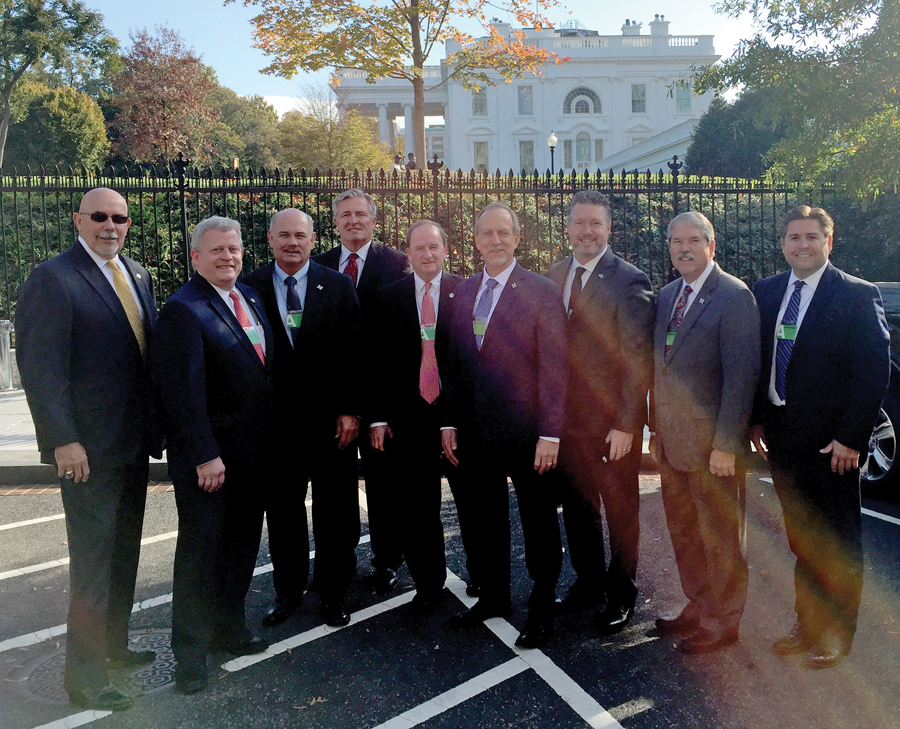
As the rays of the morning sun filter through the fence surrounding the White House, the Bay Area delegation prepares for a full day of meetings. They are, from left, Morgan’s Point Mayor Michel Bechtel, Houston City Councilman David Robinson, BAHEP President Bob Mitchell, Texas A&M at Galveston Executive Professor Col. Len Waterworth, Houston City Councilman Dave Martin, Space City Films Chief Storytelling Officer Marc Havican, Economic Alliance Houston Port Region President and CEO Chad Burke, Texas State Sen. Larry Taylor and Texas Chemical Council President and CEO Hector Rivero.
By Kathryn Paradis
The momentum to build a coastal spine to protect the people, businesses and industries of the upper Texas Gulf Coast has been building steadily since Hurricane Ike devastated the region in September 2008.
The past year has seen a huge jump in activity, notably with Texas Land Commissioner George P. Bush fully endorsing the coastal spine. An April 2017 letter from Bush to President Trump, signed by 62 committed stakeholders, further strengthened the case on the critical need for the coastal spine.
This region produces 27 percent of the nation’s gasoline, 60 percent of the nation’s aviation fuel, 80 percent of the nation’s military grade fuel, 35 percent of the nation’s natural gas production, and 42 percent of the nation’s specialty chemical feedstock. To say that the American Chemistry Council (ACC) has a vested interest in the Bay Area Houston region would be quite an understatement.
On Nov. 1-2, 2017, in Washington, D.C., a delegation of 13 held Cabinet level meetings, as well as other meetings necessary in moving the initiative forward, to create an interagency working group to champion the project.
The ACC arranged the meetings, and Cal Dooley, president/CEO, and Bryan Zumwalt, ACC vice president, Federal Affairs, led the delegation that included Texas members pictured here, as well as Stephanie Pizzoferrato, U.S. Government Affairs, Covestro LLC and Kristin Whitman, Government Relations, Shell.
STRAIGHTFORWARD
The delegation’s message was straightforward — nationalize the issue of storm surge protection for the Southeast Texas coast by showing the region’s significance to the nation’s economy, energy, defense and port related transportation.
The delegation asked for the approval and full funding of the $12-$15 billion project and expedition of the Army Corps of Engineers process to dual track engineering, construction and permitting in the same way that the New Orleans project was done post Hurricane Katrina.
The delegation’s first day began at the headquarters of the ACC to prepare for the coalition meetings. Following were meetings with the Department of Commerce, the Department of Transportation, the Army Corps of Engineers, the Department of Energy, and a dinner meeting with Texas Congressmen Randy Weber, Pete Olson, Brian Babin and John Culberson.
On Nov. 2, there were meetings with the Office of Management and Budget; Wyoming’s Sen. John Barrasso, chairman of the Senate’s Environmental Committee (Chief of Staff Dan Kunsman); Oklahoma’s Sen. James Inhofe, Senate Armed Service Committee (Chief of Staff Luke Holland); Texas Sen. John Cornyn, Senate Committee on Finance; and several staff members of the Office of the Vice President Pence.
FOLLOW UP
The next steps will be to follow up with Secretary of Energy Rick Perry, Sen. Cornyn, and the vice president’s staff to encourage setting up an inter-agency working group to push for approval, funding and expedition of the Corps process on this project.
Bob Mitchell, president, Bay Area Houston Economic Partnership, noted later, “It is significant that the ACC contacted Chad Burke of the Economic Alliance Houston Port Region, who asked BAHEP to form a special team to meet with influential offices and agencies in Washington. After nine years of work, this indicates that we’re on the cusp of getting the funding necessary to design, develop and build the coastal spine system.”

 Houston City
Houston City



